President Joe Biden’s deputies pulled at least 1.6 million economic migrants into the United States via the little-known “parole” emergency doorway in the nation’s border law, according to government data released by Sen. Lindsey Graham (R-SC).
The same parole doorway was only used 34,321 times during the six years from 2014 to 2019, or roughly 5,720 times per year, according to the data that Graham showed at a press briefing in the U.S. Senate.
RELATED VIDEO — Graham: In Trump’s Second Term “If You’re Here Illegally, You’re Going to Be Deported”:
The data shows that Biden’s deputies paroled 235 migrants for every parolee released by Presidents Barack Obama and Donald Trump.
Biden’s parole is a bonanza for migrants and their U.S. employers. They can stay for two years or more, receive an identification number that allows them to get driver’s licenses and other government documents, are put on a five-year track for government aid, and quickly get a work permit that helps them send remittances to families at home — or to pay smugglers to bring the families to the United States.
The parole issue is reportedly one of the final issues dividing Republican and Democrat negotiators in the closed-door border talks. “I don’t think we have any sticking points left,” Biden told reporters Thursday.
But this obscure “sticking point” is critical to immigration politics because parole is at the center of Biden’s little-recognized effort to build a Canada-like, low-productivity, low-wage labor supply for U.S. investors and CEOs.
Negotiations
In their closed-door talks about funding and border rules, Republican and Democrat negotiators claim they have made compromises on asylum curbs and other aspects of migration.
But they have reportedly deadlocked on parole.
CBS News reported on June 22 that negotiators — likely Democrat officials — want to win Congressional approval for expanded programs above the 1 million migrants admitted via the administration’s current parole programs:
The proposals discussed by White House and Senate negotiators include putting numerical caps on parole grants and barring migrants paroled into the country from asylum to try to ensure they leave the U.S. once their parole period expires, two people briefed on the closed-door talks told CBS News.
The CBS report did not describe the proposed cap, but a CBS tweet admitted the White House has welcomed “hundreds of thousands” of additional migrants on 60-day parole grants via a parole program shut down by a federal judge.
So far, Republican legislators are rejecting the Democrats’ parole proposals.
“If you have asylum [reform] without parole, it’s like damming one side of the river,” Sen. Tom Cotton (R-AR) said. “You have to have both.”
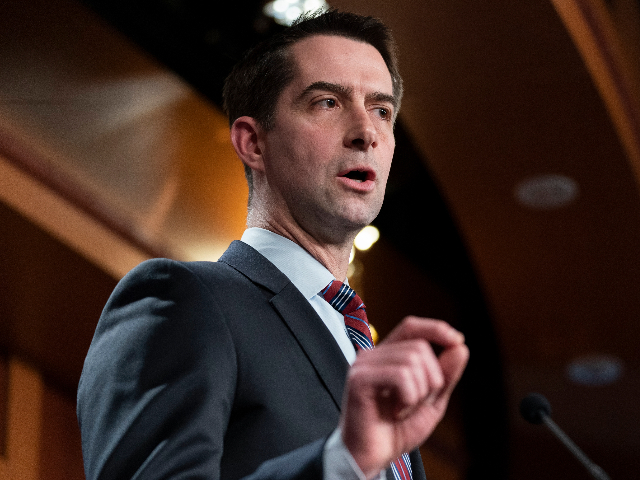
Sen. Tom Cotton (R-AR) speaks with reporters about aid to Ukraine, on Capitol Hill, March 10, 2022, in Washington. (AP Photo/Alex Brandon)
Senator James Lankford (R-OK) is the Republicans’ lead negotiator in the talks. He argued that the draft bill is “conservative” but says little about parole.
Lankford “told us, I think a couple of months ago, that parole was a red line for the White House,” Graham said at his press conference, adding his response:
To the White House: It’s a red line for all of us [Republicans]. You’re not going to be allowed to continue to do this. You’re not going to be allowed to abuse the law. You’re not going to be allowed to bring about 1.2 million people into the country … in perpetuity.
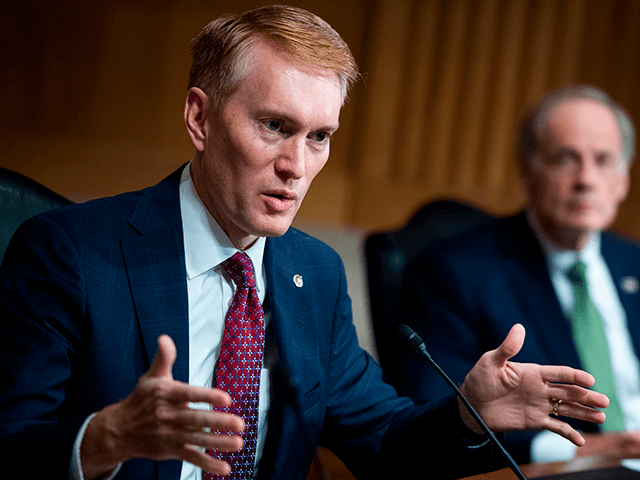
Sen. James Lankford (R-OK) during a Senate Homeland Security and Governmental Affairs hearing on June 25, 2020, in Washington,DC. (TOM WILLIAMS/POOL/AFP via Getty Images)
“Parole — the tool of choice for open borders — has to be addressed meaningfully,” Graham said in a January 20 tweet.
“The abuse and misuse of this parole authority … has to stop and it’s got to stop now,” Sen. John Thune (R-SD) said at the press event with Graham.
“I think they’re definitely closing in on parole language issue that has to be addressed … in a way that limits the abuse the authority,” Thune told reporters Thursday. “We’ll wait and see when the text comes out.”
Regardless of the negotiations or potential political concessions by Republicans, the sticking point may also disappear.
It may disappear because a judge is expected to rule on the legality of Biden’s parole programs as soon as this week, and an appeals court may also rule on the issue next month.
“Perhaps it is better at this juncture to let those cases play out,” said Andrew Authur, a former immigration judge who now works with the Center for Immigration Studies. “Those cases could very well resolve this [parole] issue, take it off the table, and allow Congress to focus strictly on the asylum abuses that are part and parcel of all of this,” he said.
Watch:
Migration Economics
Biden’s border chief, Alejandro Mayorkas, has repeatedly praised Canada’s use of mass migration as an economic strategy. In May 2023, Mayorkas told CBS:
I spoke with my counterparts in Canada, in Spain. Their [immigration] systems are designed to match their [employers’] labor needs with a potential supply of personnel who want to work and build a better life. We are stuck in an antiquated system that can’t match the two. It is just so incredibly sad.
However, the resulting inflation, productivity loss, and birth decline ensure that Canada’s migration policy is now quietly recognized as an elite-inflicted wound on Canadians’ economy.
Yet Mayorkas has tried to implement the same policy in the United States: In 2021, 2022, and 2023, he imported roughly 2.3 million migrants — including the 1.6 million people who were released on parole in 2022 and the first three quarters of 2023.
His extraction migration strategy has helped low-productivity businesses, and reduced Americans’ power to negotiate higher wages. The Wall Street Journal described one example:
Two years ago, Veselka, a Ukrainian diner in Manhattan’s East Village renowned for its pierogi, was so short on cooks and wait staff that owner Jason Birchard was ready to cut the restaurant’s hours and end table service. Then last year, the war in Ukraine broke out. The Biden administration launched a program to sponsor Ukrainian refugees to live and work temporarily in the U.S.
…
Since then, Birchard has sponsored 10 Ukrainians, mostly extended family members of his existing employees, and eight now work at his restaurant. “One of my biggest challenges postpandemic was hiring. Not so anymore,” he said. “It’s been a win-win for me.”
His parole program is also extracting white-collar dissidents from Central American autocracies that profit from their export of young rebels. The Associated Press reported Thursday:
Political journalist Marcelo Conde fled Nicaragua last year after he received death threats because he was not in favor of President Daniel Ortega … After he finally arrived in the U.S., he received an authorization to work. In Nevada, he is waiting tables. Conde speaks Spanish, French and English and hopes soon to work as a journalist in the U.S.
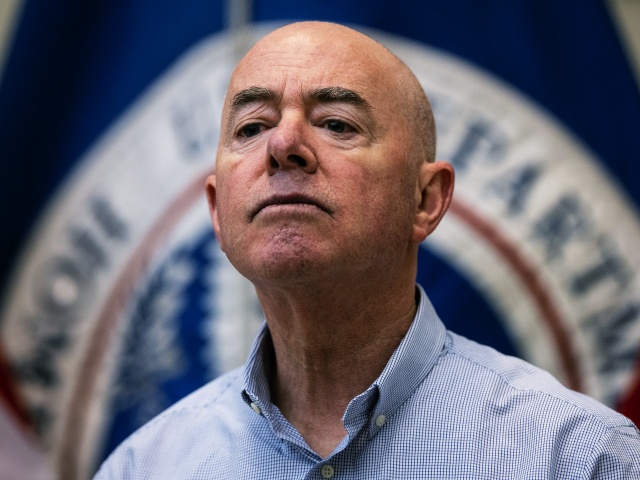
Department of Homeland Security Secretary Alejandro Mayorkas holds a press conference at a U.S. Border Patrol station on January 08, 2024 in Eagle Pass, Texas. (John Moore/Getty Images)
Mayorkas is also using parole to allow chain migration migrants from favored countries — such as Ecuador — to bypass the waiting line for green cards.
The migrant inflow is worsened by at least 1 million “gotaways,” at least 400,000 children and job-seeking youths, and by Mayorkas’s policy of minimizing the deportations of illegals who settle in American communities.
Mayorkas’s inflow is in addition to the annual inflow of roughly one million legal immigrants and one million temporary workers. All told, Mayorkas is importing almost four migrants for every five U.S. births.
The vast inflow has suppressed wages, spiked housing costs, cracked public support for migration, and expanded chaotic diversity — while boosting Wall Street. Unsurprisingly, this deputy-created economic policy is very unpopular — and is likely the biggest threat to Biden’s reelection campaign.
Mexico
Government data suggests that Mayorkas is also using parole migration to trade favors with Mexico and perhaps other countries, such as Venezuela and Ecuador.
The evidence for the Mexico swap can be found in a complex document released on January 5 by Mayorkas, Biden’s pro-migration border chief.
The document detailed how the administration released more than 2.3 million migrants into the United States in 2021, 2022, and 2023, not counting migrants released by the ICE agency.
Under the tab titled “SSWB Book-Outs by Citp,” Mayorkas’s agency reported that parole for Mexicans by the border agency’s Office of Field Operations averaged 14,009 per year from 2014 to 2019. It does not describe the reasons for the parole, which could have included visits for business, job interviews, or medical emergencies.
But the number of paroled Mexicans spiked to 20,948 in 2022 and then exploded to 93,633 in 2023:
“I think that’s part of the dirty deal that Biden has with AMLO,” or Mexican President Andres Manuel Lopez Obrador, said Arthur. Under a January 2023 policy with AMLO, “we’re supposedly going to toughen up the border [we but] loosened it up for the Mexicans,” he said.
Biden’s deal with Mexico is not intended to stop migrants. It is intended to have Mexico’s government calm, regulate, and distribute the migrant flow so that it does not trigger coverage on evening TV news shows.
Mexico’s government has repeatedly asked Biden to ease migration — especially Mexican migration — into the United States. The request is usually tied to Mexico’s promise to block migrants from reaching the U.S. border. In April 2021, for example, Bloomberg News reported:
“President Andres Manuel Lopez Obrador said that he would propose the plan to U.S. President Joe Biden at a summit on climate change on Thursday. He said the plan could create more than a million jobs and that participants in the reforestation program should be given a chance to obtain U.S. work visas and, eventually, even U.S. citizenship.
“This would allow us to order the flow of migration, which overflowed in March,” Lopez Obrador said in a video posted on Sunday from his ranch in the southern state of Chiapas.

President Joe Biden is greeted by Mexican President Andres Manuel Lopez Obrador as he arrives at the National Palace in Mexico City, Mexico, on January 9, 2023. (AP Photo/Andrew Harnik)
Throughout Biden’s administration, AMLO has allowed migration swells over the border, most recently in December 2023. Each of these swells has created major PR problems for Mayorkas.
In late December, as border numbers began to reach 10,000 people per day, one U.S. official told the Washington Post “Everything revolves around getting the Mexican government to do targeted operations” against migration,” he said.
Biden’s deputies pushed back against Mexico by blocking some railroads that carry Mexico’s exports — such as perishable food — into the United States.
The two sides reach a deal in late December and early January. The U.S. Department of State announced on January 20:
Secretary of State Antony J. Blinken hosted Mexican Foreign Secretary Alicia Bárcena yesterday at the Department of State to follow up on migration commitments made on December 27 in response to the invitation of President Andrés Manuel López Obrador.
…
During the meeting, Secretary Blinken and the U.S. delegation noted that our coordinated efforts with Mexico are demonstrating positive results at our shared border. They discussed the positive impact of efforts to increase migration controls on bus and train routes, crack down on criminal smuggling networks, and scale up repatriations for those who do not have a legal basis to remain in our countries.
“Just in time for election year, border crossings have plummeted — a sign that Joe Biden has struck a secret deal with the Mexican president to help his campaign,” said a New York Post article by Todd Bensman, a border expert who travels through the migrant encampments in Central America to the border. He continued:
Daily … encounters of illegal immigrants crossing the border was 12,000 to 14,000 per day at the end of December. But according to government data confidentially shared with me, it has dropped to a still managerially catastrophic yet smaller 4,000 to 5,000 a day.
Mexican newspapers are reporting numerous efforts by Mexico to block migrants, Bensman wrote in his New York Post article:
“After the arrival of thousands of migrants aboard cargo trains during the last quarter of 2023, a train with around five people headed to the border was observed,” wrote El Diario on January 12. “The small group traveling on a wagon was photographed by a resident of that town, who at the end of last year witnessed the passage of different trains with hundreds of people towards this border.”
So what does Mexico get in return for minimizing the visibility of the migration? Minimal criticism of Mexico’s degradation of democracy, minimal pressure to curb Mexico’s export of fentanyl, plus more paroles for Mexican migrants.
Democrats and Republicans recognize Mexico’s role in the talks.
“Don’t be fooled into thinking the border is more ‘secure,'” said a January 17 tweet by Rep. Chip Roy (R-TX). “Biden and AMLO are pushing numbers down ahead of the election.”
“If you’re creating new authorities, the reaction of your international partners matters,” Sen. Chris Murphy (D-CT) told Semafor on January 14. “That’s why you can’t write an immigration reform bill with changes in border policy overnight … you have to factor in how partners, in particular the Mexican government, will react,” said Murphy, the lead Democratic negotiator in the border talks.
Business
Corporate lobbyists are adamant that the parole pathway be preserved.
By far the most influential business group is Mark Zuckerberg’s FWD.us which represents wealthy West Coast investors and has very close ties to Biden’s top deputies.
This group seems to have blocked a White House plan to compromise on parole.
The group funds many apparent grass-roots pro-migration groups, supports lawsuits to ease migration, and helps reshape the media’s narrative and language about migration. For example, Todd Schulte, the president of FWD.us, portrays the current negotiations as an effort to manage more migration — not an effort to preserve the existing labor rights of American families from the ambitious CEOs and investors who profit from additional imported blue-collar workers, white-collar workers, consumers, and renters.
On January 17, for example, Schulte used a progressive podcast site to tout his “relieve pressure on the border” narrative:
The core of a broken immigration system at the border, I think, is a broken legal immigration system. If you want to see how you can relieve pressure on the border, we should have work permits [for migrants] … Ultimately, if [foreign] people are trying to escape poverty — that’s maybe not a traditional sense that they’re a refugee — but we want those people to be able to come and build a better life here.
…
I think it’s important to keep in mind that the things that are being demanded right now, things like eliminating immigration parole … are things that some people who want to restrict immigration have wanted for a long time. They are not things that are going to reduce unauthorized border crossings.
Schulte’s narrative — “relieve pressure on the border” — is widely shared by Democratic legislators, journalists, and some Republicans.
The list of investors who founded and funded FWD.us was hidden from casual visitors to the group’s website in early 2021. But copies exist at the other sites.
Lawsuits
Biden’s vast migration ignores the popular and unchallenged immigration laws that were passed to protect American families from the many unscrupulous companies that would hire cheap, desperate, and diligent illegals instead of hiring Americans at decent wages and under decent conditions.
But Republican legislators have also ignored the lawsuits that can torpedo Biden’s cheap-labor economy without the GOP having to make political concessions or split their own ranks.
Four lawsuits have been filed against Mayorkas’s parole releases for violating the 1996 update to the parole law that says parole must only be given on a case-by-case basis for “urgent humanitarian reasons” or “significant public benefit.”
“The parole statute does not permit what DHS is doing,” Matt Crapo, senior counsel at the Immigration Reform Law Institute, told Breitbart News.
A Florida suit struck down one parole gateway and is being appealed at the Eleventh Circuit on January 26.
Another suit has been filed by AGs against the “CBP One” parole program for migrants crossing from Mexico. Texas’ AG has also filed a lawsuit against the CBP One pathway.
However, a judge is expected to soon release his judgment of a lawsuit by multiple state Attorneys general against the “CHNV” parole program. The Mayorkas-invented program brings in roughly 340,000 workers a year from Cuba, Haiti, Nicaragua, and Venezuela, regardless of the laws barring the hiring of foreign workers.
“Any day now the district court could issue a decision in that case,” Crapo said. “It’s huge.”
With the court cases underway, “there’s no reason for Republicans to negotiate against themselves when it comes to the parole abuses of the Biden administration,” said Arthur. He continued:
Members of Congress need to appreciate that the Constitution has given them the authority to decide who is allowed to come into the United States and who has to leave. that power is central to this issue. When it comes to all of the powers that Congress has, this is the one that the Constitution has given exclusively to Congress [and] this administration has already proven they can’t be trusted even with the laws that Congress has written.
The Supreme Court has been reluctant to intervene in the politics of immigration, he said, but it has not undermined Supreme Court precedent from 1954, “Galvan v. Press,” which declared:
Policies pertaining to the entry of aliens and their right to remain here are peculiarly concerned with the political conduct of government. . . . But that the formulation of these policies is entrusted exclusively to Congress has become about as firmly imbedded in the legislative and judicial tissues of our body politic as any aspect of our government.

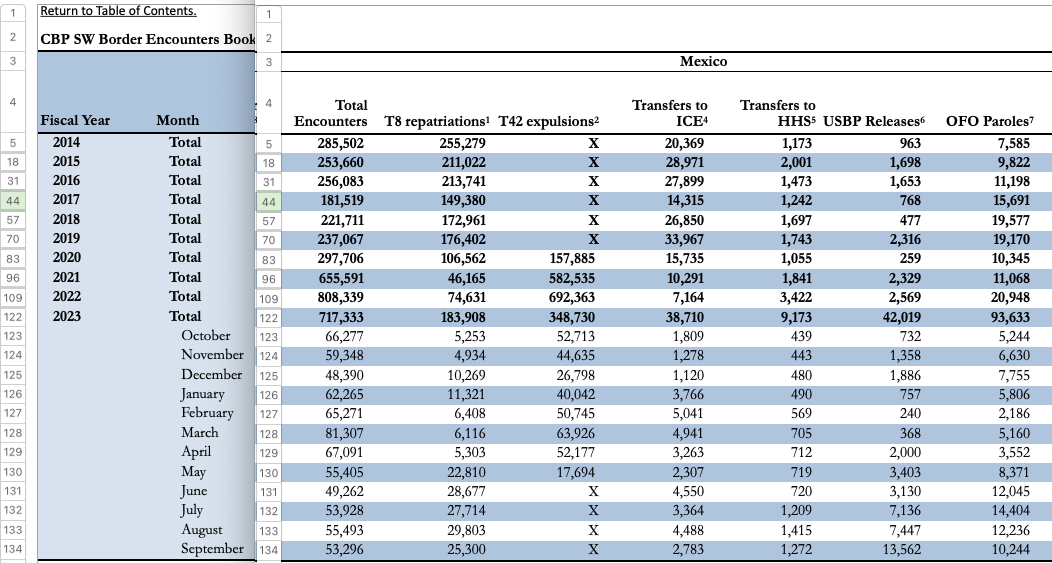
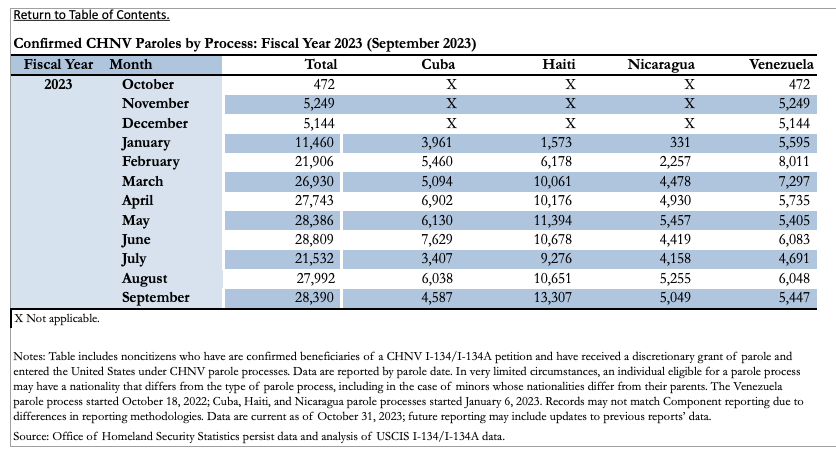
COMMENTS
Please let us know if you're having issues with commenting.